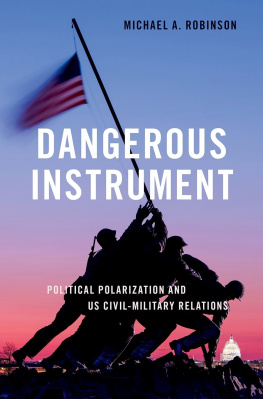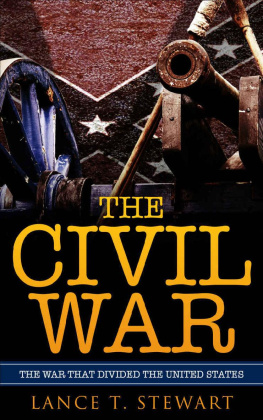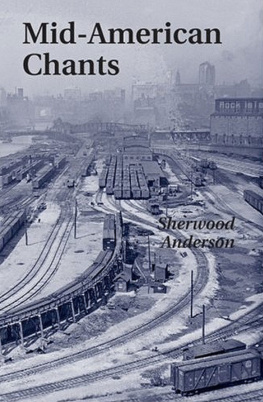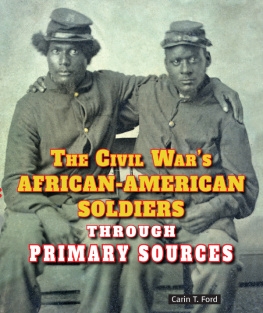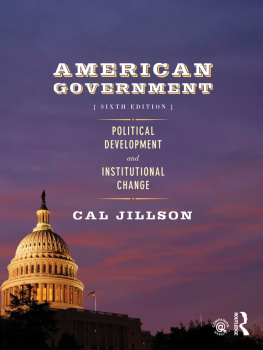Anderson provides fresh insights into dynamics of secession that changed the path of the nation in the mid-1800s. The books original research carefully details the growing estrangement of Southerners and especially the South Carolina radicals who tested and ultimately crossed the frontiers of national loyalty. By exposing the fatal mixture of federalism and polarization that paved the way to national tragedy, Anderson holds up a distant mirror to todays turbulent politics.
David Brian Robertson, University of Missouri St. Louis
This book makes important new contributions both to the general theory of federalism, secession, and stability; and to the issues of American stability and disunion in the years leading to the Civil War. Focusing on the critical state of South Carolina, Anderson explains the forces generating this states leadership in the Southern movement to protect slavery and, ultimately, in the path of secession from the United States.
Barry Weingast, Stanford University
Federalism, Secession, and the American State
One important tradition in political science conceives of the Civil War in the United States serving as the functional equivalent of the English and French Revolutions, bringing with it the victory of liberal democratic industrialism over aristocratic agriculturalism. From this perspective, the Civil War is notable for its impact on the American state. Surprisingly however, little attention has been paid to the distinguishing features of this historic rupture in American politics.
Through primary source research and the re-analysis of the rich historical literature about the antebellum era and the causes of the Civil War, Lawrence M. Anderson explores the relationship between federalism and the movement for secession in the United States during the pre-civil war era. Focusing primarily on South Carolina, Anderson carefully revisits theory on institutional analysis of political development to expose what caused secession in the United States
Lawrence M. Anderson is an associate professor of political science at the University of Wisconsin-Whitewater. He teaches mainly in the area of American politics. His research interests include federalism and secessionism.
Routledge Studies in North American Politics
| 1 | Political Institutions and Lesbian and Gay Rights in the United States and Canada |
| Miriam Smith |
| 2 | Black Women, Cultural Images and Social Policy |
| Julia S. Jordan-Zachery |
| 3 | How Courts Impact Federal Administrative Behavior |
| Robert J. Hume |
| 4 | State Failure, Underdevelopment, and Foreign Intervention in Haiti |
| Jean-Germain Gros |
| 5 | Mexico-United States Relations |
| The Semantics of Sovereignty |
| Arturo Santa-Cruz |
| 6 | Federalism, Secession, and the American State |
| Divided, We Secede |
| Lawrence M. Anderson |
First published 2013
by Routledge
711 Third Avenue, New York, NY 10017
Simultaneously published in the UK
by Routledge
2 Park Square, Milton Park, Abingdon, Oxon OX14 4RN
Routledge is an imprint of the Taylor & Francis Group,
an informa business
2013 Taylor & Francis
The right of Lawrence M. Anderson to be identified as author of this work has been asserted by him in accordance with sections 77 and 78 of the Copyright, Designs and Patents Act 1988.
All rights reserved. No part of this book may be reprinted or reproduced or utilised in any form or by any electronic, mechanical, or other means, now known or hereafter invented, including photocopying and recording, or in any information storage or retrieval system, without permission in writing from the publishers.
Trademark Notice: Product or corporate names may be trademarks or
registered trademarks, and are used only for identification and explanation without intent to infringe.
Library of Congress Cataloging-in-Publication Data
Anderson, Lawrence M.
Federalism, secession, and the American state : divided, we secede /
Lawrence M. Anderson.
p. cm. (Routledge studies in North American politics ; 6)
Includes bibliographical references.
1. Federal governmentUnited StatesHistory19th century.
2. SecessionUnited StatesHistory. 3. States rights
(American politics)History19th century. 4. Nullification
(States rights)History19th century. 5. United StatesPolitics
and government19th century. 6. South CarolinaPolitics and
government17751865. I. Title.
JK311.A63 2012
320.473049dc23
2012010857
ISBN: 978-0-415-51832-1 (hbk)
ISBN: 978-0-203-09566-9 (ebk)
Typeset in Sabon
by IBT Global.
As it is, we have the wolf by the ears, and we can neither hold him nor safely let him go. Justice is in one scale, and self-preservation in the other.
Thomas Jefferson, on slavery
Our Federal Unionit must be preserved.
Andrew Jackson
The Unionnext to our liberty, most dear.
John C. Calhoun, responding to Jackson
The only question is can the Union and Slavery exist together?
William Henry Trescott
I believe this Union and slavery cannot stand together.
Armistead Burt
Whom the gods would destroy, they fi rst make mad.
Euripides
For JZAB
It wouldnt be any fun without them



